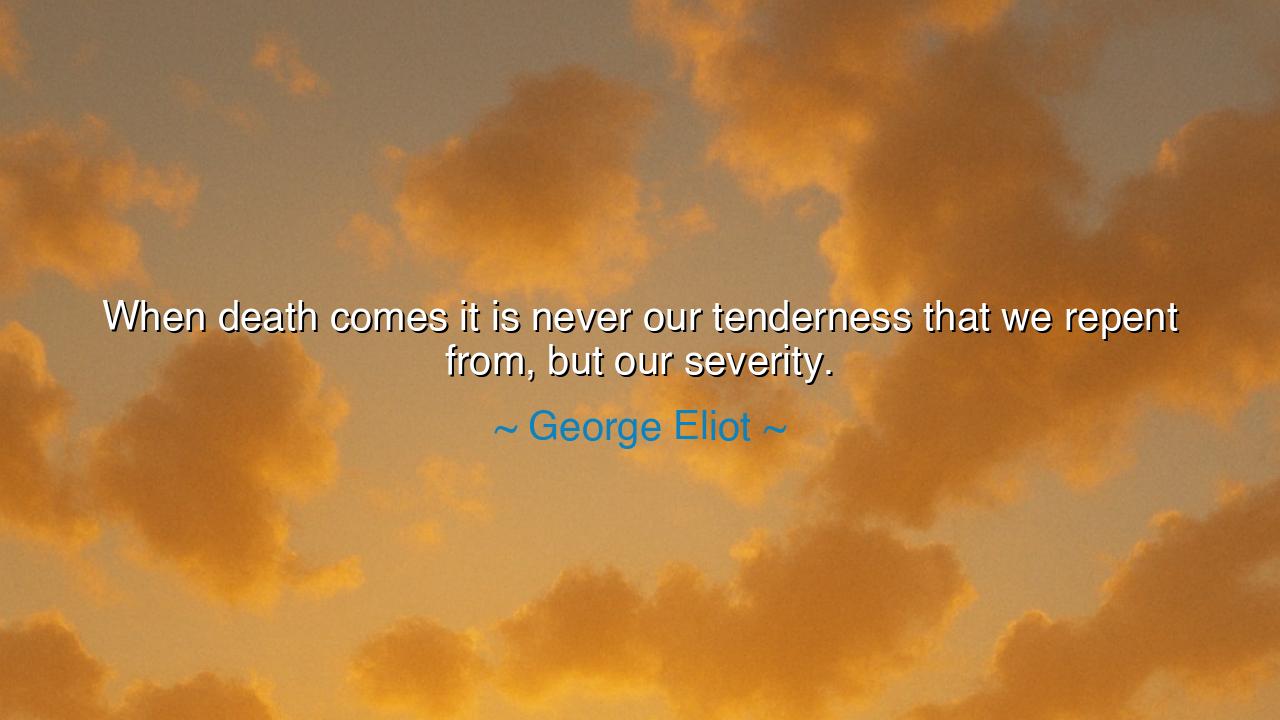
When death comes it is never our tenderness that we repent from






“When death comes it is never our tenderness that we repent from, but our severity.” Thus wrote George Eliot, the great moral voice of the Victorian age, whose heart carried the wisdom of both philosopher and poet. In this sentence lies a truth as ancient as human sorrow—that at the twilight of life, when the shadows lengthen and the noise of the world falls silent, it is not the love we gave too freely that burdens us, but the kindness we withheld. For when death draws near, all pride and anger dissolve like mist, and only the echoes of our compassion or our cruelty remain. Eliot, whose pen was ever tuned to the subtleties of conscience, reminds us that tenderness is never wasted, while severity, however righteous it may seem in the heat of the moment, leaves a wound that time cannot heal.
The origin of this thought springs from Eliot’s lifelong meditation on human frailty and moral growth. Born Mary Ann Evans, she lived in an age that often judged more harshly than it forgave. Yet through her writings—through the souls of her characters in Middlemarch, Silas Marner, and The Mill on the Floss—she gave voice to a gentler creed: that mercy is greater than judgment, and that to understand is the beginning of all goodness. Her own life, marked by social rejection and the quiet endurance of love unapproved by society, made her deeply aware of how easily the heart turns cold under the guise of virtue. Her words here are not born of abstract philosophy, but of lived experience—the confession of one who had seen that forgiveness, not severity, is the truest strength of the human spirit.
Think, for a moment, of the nature of repentance. It is the soul’s backward glance at the road already traveled—the recognition of where love should have spoken, but remained silent; where anger triumphed over patience; where pride silenced understanding. No man, standing at the edge of the grave, ever mourns that he was too gentle, too forgiving, too kind. Yet countless hearts have been broken by the memory of a harsh word, a friendship severed, a moment of mercy denied. Tenderness, unlike wealth or fame, cannot be taken from us by death. It is the only legacy that endures beyond the tomb, for it lives in the hearts of others. Severity, however, dies with us—or worse, survives only as pain in those we leave behind.
This truth has been illuminated throughout history. Consider the story of Emperor Marcus Aurelius, philosopher and ruler of Rome, who wrote in his Meditations that “to be gentle is to be invincible.” Though he commanded legions and governed an empire, he understood that cruelty weakens the soul while tenderness ennobles it. In the hour of his death, it was said that Aurelius wept not for conquests unfinished, but for the times he had failed to show compassion to those closest to him. Like Eliot, he recognized that it is not the fierce acts that shape eternity, but the quiet mercies—the hand extended to the fallen, the word that soothes rather than wounds.
In the smaller, more intimate histories of mankind, we see the same truth repeated. A parent on their deathbed remembers not the times they indulged their children’s laughter, but the moments they scolded too sharply. A friend regrets not the love they shared, but the silence they kept when apology was needed. Even nations learn this lesson in time: the harshness of war may bring victory, but it is tenderness—the rebuilding, the reconciliation—that brings peace. The poet was right to name death as the great revealer, for in its presence all illusions fall away, and we see at last that only love has meaning.
Yet Eliot’s words are not meant to sadden, but to awaken. She calls us to live now as we would wish to have lived when our final hour comes—to choose tenderness over severity, to forgive before bitterness takes root, to speak kindness while the living can still hear it. There is no wisdom in waiting for death to teach us what love already knows. In a world too eager to condemn, to compete, to harden itself against vulnerability, tenderness becomes a revolutionary act. It requires courage to be gentle; it demands strength to respond with mercy when anger would be easier. But it is this courage that fills life with meaning and keeps the soul uncorrupted by time.
So, my friends, learn from George Eliot’s gentle yet unyielding wisdom. Do not fear that kindness will make you weak, for it is severity, not tenderness, that diminishes the soul. Be generous with your affection, patient with the faults of others, and slow to judge. When tempted to punish, remember the quiet voice that will one day whisper at the end of your days: “It is not the love you gave that you regret—it is the love you withheld.” Live, then, as one who will face that hour without shame, rich not in possessions, but in compassion.
For when death comes—and it will come for us all—it will strip away every mask but one: the measure of our hearts. And in that moment, as Eliot reminds us, it is tenderness, not severity, that will prove to have been our truest strength, our greatest triumph, and our everlasting peace.






AAdministratorAdministrator
Welcome, honored guests. Please leave a comment, we will respond soon